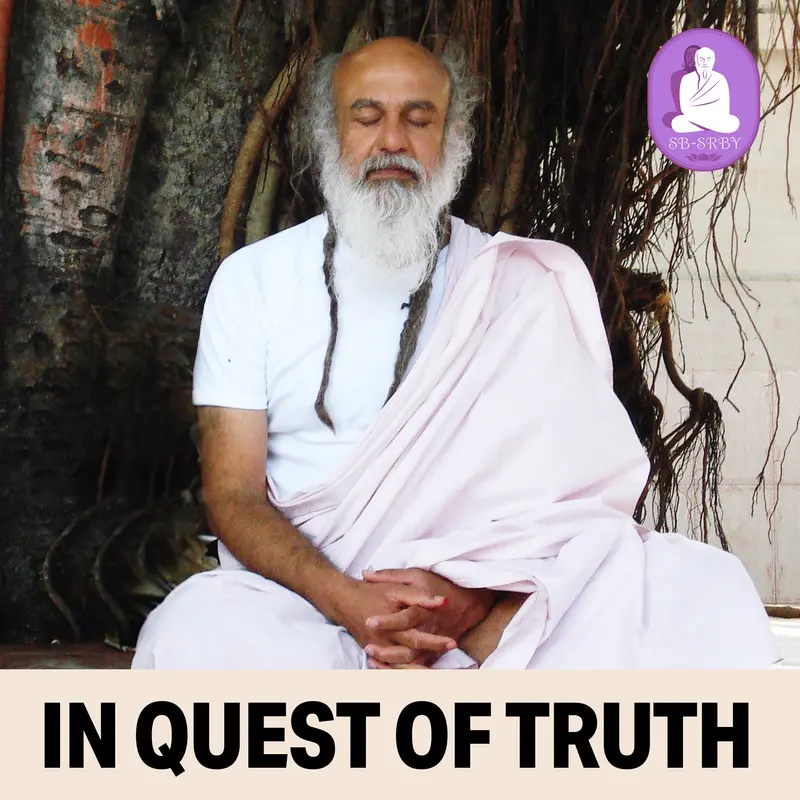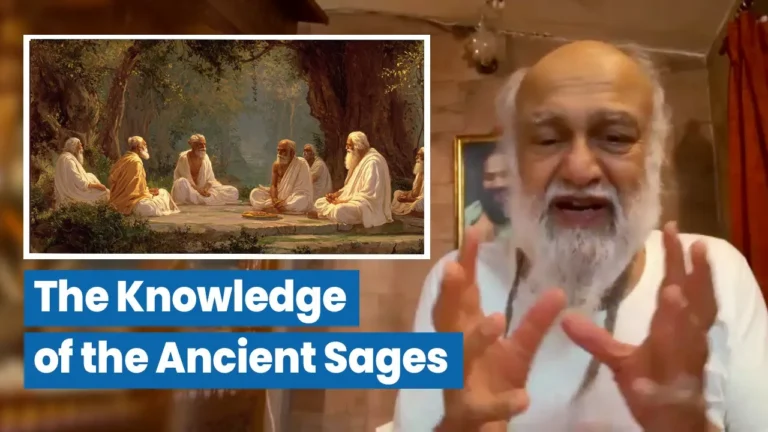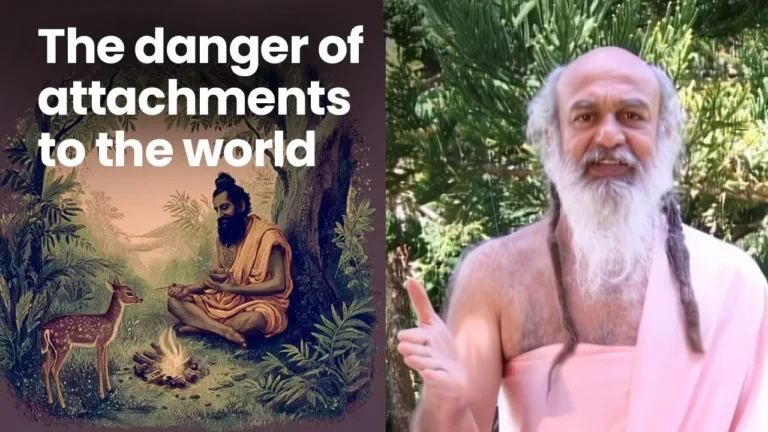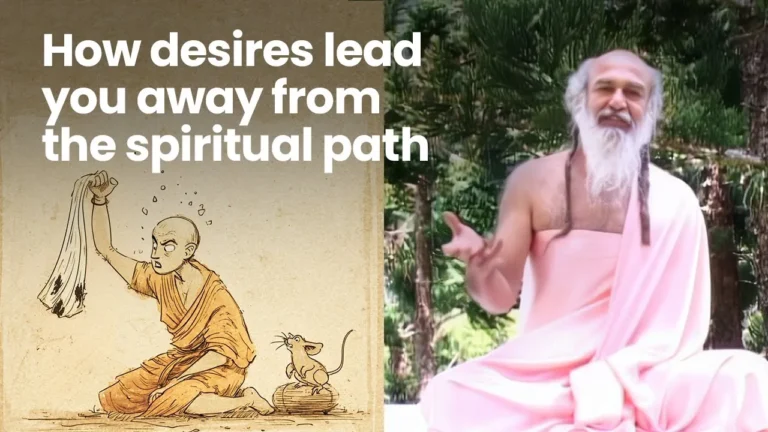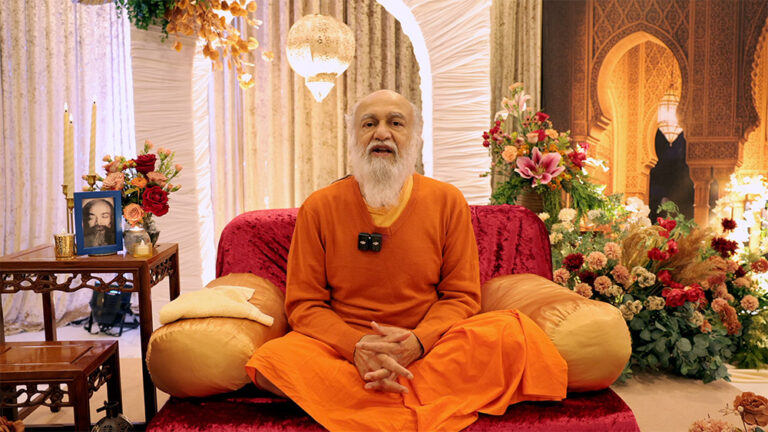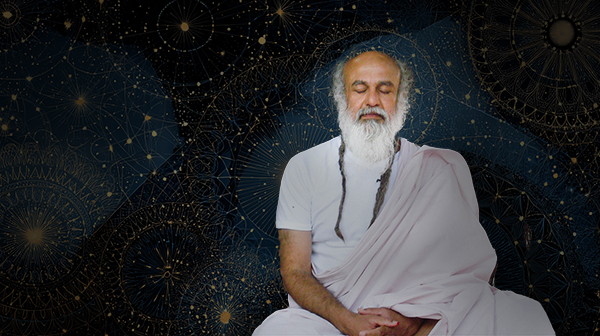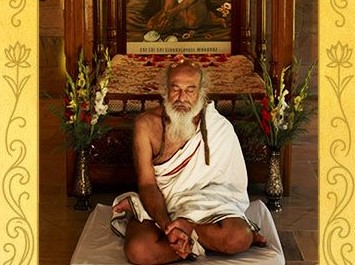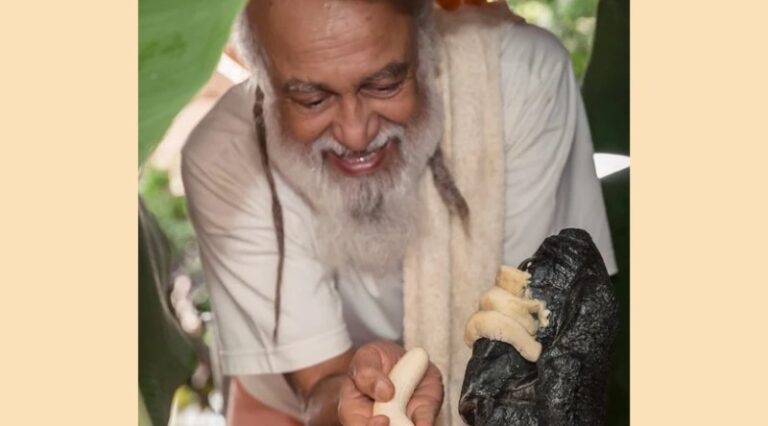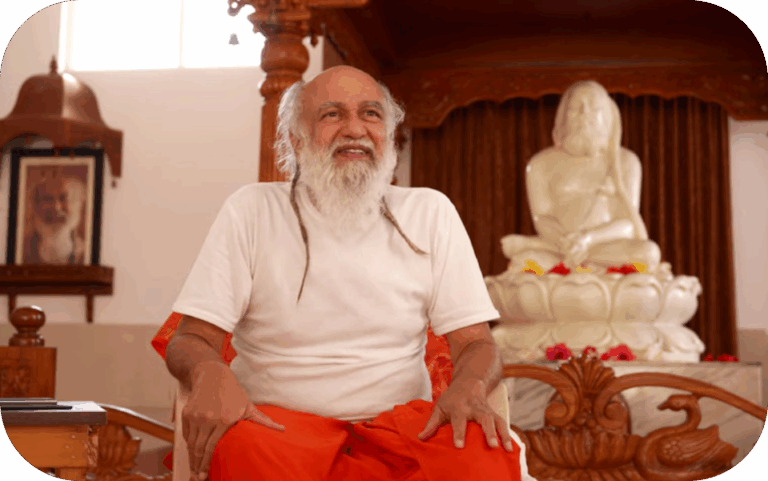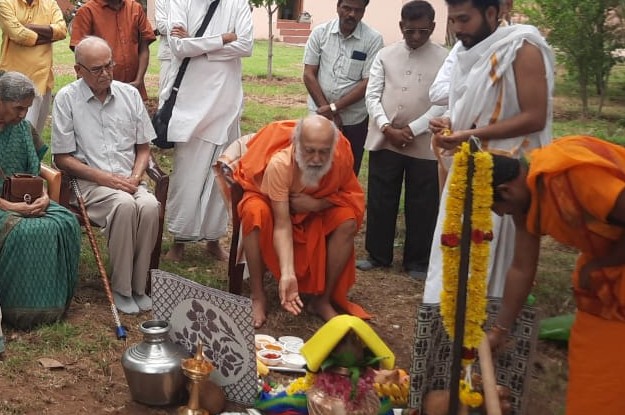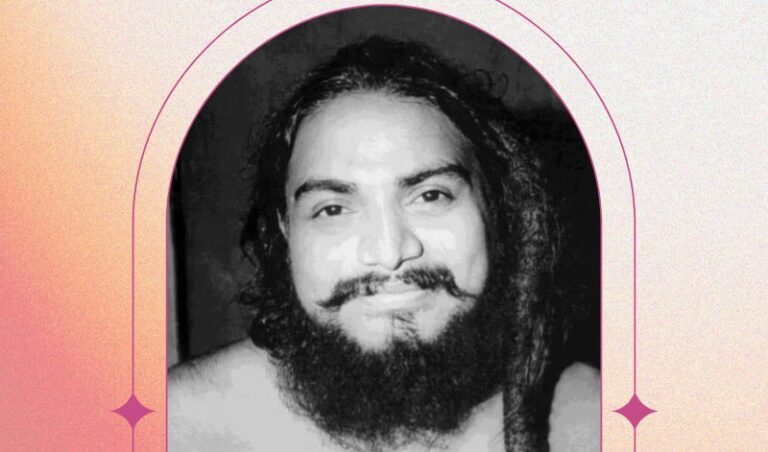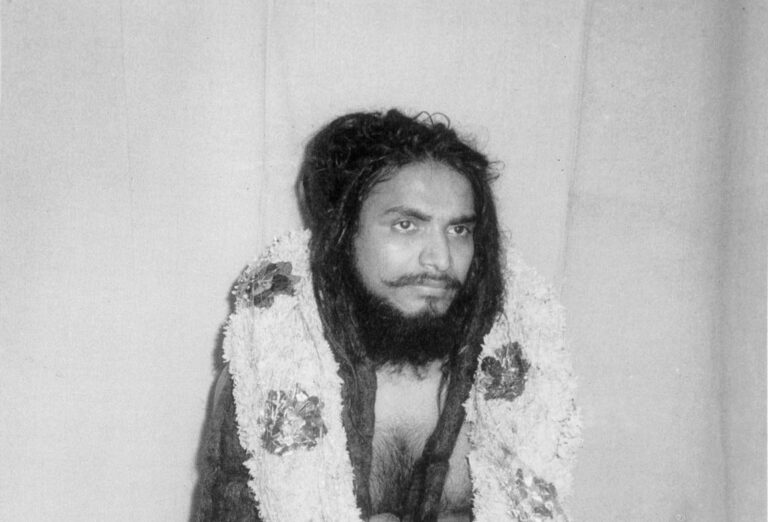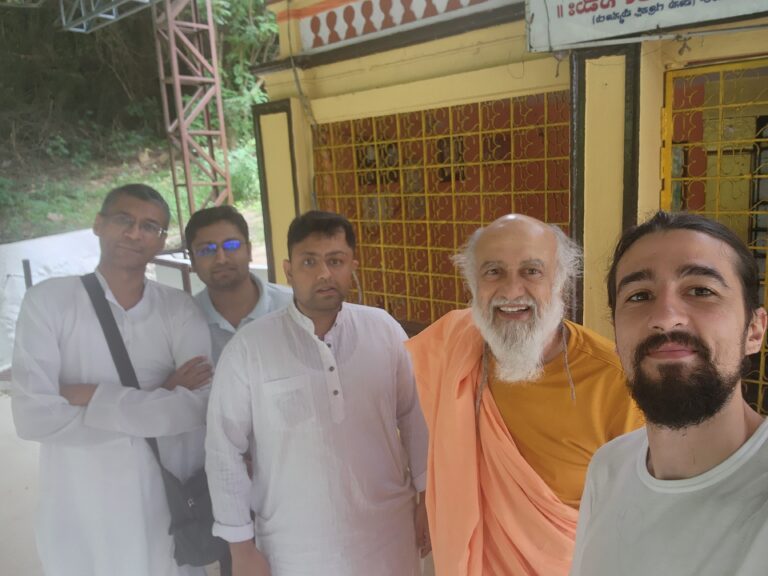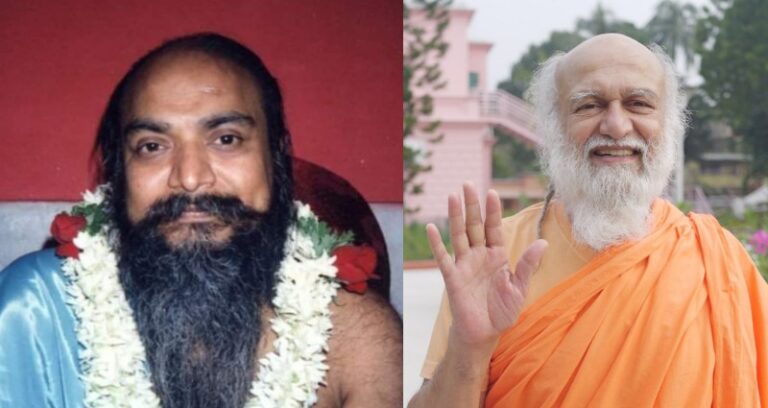Recorded on 26 November 2022 with worldwide participants.
Babaji explains, step-by-step, the instructions of the meditation technique Jangama Dhyana.
0:00 Meditation instructions from Babaji
2:10 The meaning of ‘dhyana’
4:20 Meaning of ‘jangama dhyana’
6:07 The posture for meditation
8:19 Importance of closing the eyes in meditation
11:36 Why the eyeballs are used to concentrate in meditation
16:13 The secret of ‘just watching’ in meditation
19:16 Purification of the imprints or acquired habits in the mind
27:02 If we don’t support the thought, the thoughts disappear
28:05 What Babaji means by ‘no third way’ for the mind
34:40 The importance of a master to guide in meditation
41:41 The benefits of sitting with a master
43:26 How we give too much importance to the thoughts
45:32 What do we do away from meditation, while in the world
Discourse: Thus Spake Babaji – online Q and A No. 119
Jangama Dhyana
Recorded: 26 November, 2022 with worldwide participants
Babaji Commences:
For any newcomers I’ll just tell the method of meditation. You can sit in any comfortable posture. You are advised to keep your back and neck straight. And always gentle, be gentle to yourself because the mind is the most infinite form; you cannot catch hold of the mind through any other means except the mind itself. For that you pray for the Grace of the real Self, that is the Divine. And keeping the eyes closed, you have to concentrate your mind and sight in-between eyebrows; just keep watching there without bothering what the target is, “Why I have to watch there?” You will understand soon. In the question and answer also I can always elaborately explain. Because eventually the mind has to watch itself. That’s what you are trying to do. For that the mind has to become quiet. It is preoccupied with its own imaginations of thousands and millions and millions of thoughts and visions that are coming. That needs to be stopped. But you don’t have to worry if there are thousands and millions. They all can go away just like that if only you learn to become quiet mentally, not to analyze, not making any judgments. Just you have to watch in-between eyebrows, that is important.
Start of Questions and Answers
Question: Babaji, today’s theme is on the meditation technique Jangama Dhyana that Swamiji and Babaji both practiced to achieve Self-realization. And this is the same technique that Babaji continues to teach to all. Could Baba first explain the meaning of the Sanskrit term ‘dhyana’ please?
Babaji Maharaj: Dhyana is ‘your attention to’. You paying attention. Like just now, if you watch, everybody’s mind will be totally preoccupied watching their own imaginations which come as a thought or a visual effect. Like visions and thoughts, characters, stories; it becomes a chatterbox. So, its attention always goes on to that. Now, instead of allowing the mind to pay attention to its imaginations, slowly you have to turn its attention to itself. That is possible only when all thoughts and visions disappear. They dissolve within the mind. The mind becomes purified. A purified mind regains the form of Pure Consciousness. Pure Consciousness is the nearest word we could imagine for this truth of existence because wherever you are apply your consciousness you can become aware of that. So, that is the dhyana – when you apply your awareness. And then you become aware of that existence.
Now, mind has to apply to itself and then it becomes aware of itself how it exists as the eternal entity. That’s what we always tell, immortal and eternal entity, also; that’s what we call that one. That is what is dhyana. Like when you are driving a car, pay attention that you drive properly, your attention is on the road and you don’t divert your attentions, then the vehicle can meet some accident. So, that is important. So, that is what dhyana means.
Question: Thank You Babaji. So, jangama then is the eternal existence and your jangama dhyana would be attention to the eternal existence. Is that right Babaji?
Babaji Maharaj: Yes, exactly. jangama means eternal existence, and the opposite word for this is stavara. Stavara means impermanent existence, that which is destructible or will disappear. So, whatever it is. Like this world, this universe, all appearance. So, the eternal is jangama. That’s what Swamiji meant – so, jangama dhyana, your meditation on the eternal existence or you paying attention on to the eternal existence that your real Self is. You as that eternal existence – you need to become aware. That is the idea of meditating, so that gradually you give up attention to all imaginations of thoughts and visions, and then it turns introvert to itself. So, then you become aware of yourself, how you are much more beyond this physical body, its birth and death, and you are that eternal existence; you become aware of itself. Just like when you are watching a movie, all your attention would have gone to the movie, and then you withdraw that, and realize that you are just sitting and watching a movie; like that.
Question: Thank You Babaji. I have some more questions on the Self and the watching later on. But to start with, could Babaji go through… Babaji has already explained the meditation instructions at the beginning, but to go through each line. So to start with, “Sitting comfortably and keeping the back and neck straight.” Can Babaji explain the importance of that posture?
Babaji Maharaj: Yeah, so our Master Shivabalayogi was a very unique teacher, and He did not prescribe any particular posture, because His idea was – always He used to say – “Meditate. No other excuse must be given so that you don’t have to meditate.” Say, if I prescribe a particular posture, a lotus posture, many people may not be able to sit in the lotus posture, and they might simply give up meditation, telling “I cannot sit in the lotus posture. I cannot meditate then.” But Swamiji said “No, meditate. That is the foremost importance – your attention, your mind control. For that you sit in any comfortable posture.” That’s how He said always, in a unique way. So you can sit on a chair or you can sit folding the legs, and if necessary, in your home – in a public gathering it might be sometimes difficult… Also, straightening the legs and sitting like that in some cultures is considered disrespectful to the Master if the Master is sitting there also. But at your home you can straighten your leg and sit also. But we recommend that you just keep your back and neck straight so that you don’t fall asleep and your head doesn’t fall down. So you are straight while meditating. So that’s what is the posture. Any posture, any comfortable posture is all right. You don’t give an excuse that because of the posture you are unable to meditate. “You sit in any comfortable posture.” That’s what Swamiji always told.
Question: Thank You Babaji. And the next line would be to “Close the eyes” – the importance there of shutting off the external stimulus. Could Babaji talk about that?
Babaji Maharaj: Yeah. Once, Swamiji answering this question told, “There’s already one solid world in front of you which is a manifested form of the Divinity. That is so distractive because of its impermanence and it is bound by the time. Because of the time binded, its shape keeps changing; it doesn’t stay as one entity, in one shape or in one form, in one name like that. A physical body might be simply a handful of ashes if it is cremated.” So, that’s how He said. Because of this it can be very disturbing to the mind. Mind is already spinning. So, when it watches this much of activity of the universe, tremendous amount… Like, you see, compared to this universe and all the Milky Way, galaxies, everything that’s explained, our eyes, our physical body is very, very limited. It’s like a small ant, micro speck type of thing. Imagine how disturbing. Even a small movie on a screen, on a TV screen, on a laptop screen, anywhere, can be so emotional generating, makes the mind spin in such a way – fear, panicking, excitement, and unhappiness, sadness. All it can generate, all emotions. So that’s why Swamiji said it is essential and recommended that you close the eyes. When you close the eyes, then you come across the world that is within your mind, inside. When you are opening the eyes, it’s a combination of both. You get to see this manifested world and that world that is in your mind. So, whenever you get to see this manifested world, your mind can be absorbing more imprints of the presence of this world as a reality. So, that increases, so your effort in cleansing the mind becomes very difficult. So, that’s why it’s recommended that you close the eyes so that you forget the outside world, don’t get to see it in the eyes, and slowly get rid to see through the mind also. So, make it quiet. That becomes easier and better. So, that’s why it is essential that you need to close your eyes. And also any foreign particles might fall into the eye; eyes can become… something harmful can happen. So, to avoid all these things, finally it is recommended that you keep your eyes closed. Gently, just close, don’t have to force open. So that’s important.
Question: Thank You Babaji. And then, “Concentrating the mind and sight in-between the eyebrows.” So, the use of the eyeballs. The eyeballs are used to focus the mind. Could Babaji explain why the eyeballs are used?
Babaji Maharaj: See, eyes are one of the strongest sensory organs, among others. Like for example if I tell one story to you all, you all listen through your ears but the same story if I make it like a picture, dramatize it, picturize and then show it as a cinema-type picture, that can sit into the mind very strongly much more. Its impressions can be very strong. That’s why even in our school days we were given the visual education also. Through visions or through slides or through movies we used to be given some education about certain topics. So, these things all we saw. So, thus, it is the very strongest. So, when you can fix the eyeballs onto one point, it can withhold the mind also there, strongly. Both go together. If one is stronger, the other comes. Like when I’m talking, you are trying to watch me on the screen in front of you, all of you. Then strongly watch through the eyes, fix the eyeballs, then your mind also will be there; it won’t be able to run away anywhere else, it cannot go to any shopping complex, London or America, anywhere. It will be there, here, watching on the screen, me. That is the power of the eyes and the essence of eyes.
So that’s why here when you close the eyes, fixing the eyeballs, you fix the mind also there. You practice like that. Steadily if you watch without bothering what you have to watch, just watch in-between eyebrows, through the eyes, then you will see the mind steadily starts stopping there, slowly in due course of time. All its imaginations come to an end, all thoughts and visions dissolve. That’s why Swamiji often told, “When I give instructions to sit for meditation every day, if only people can consider that it’s a commander who is giving you the command to do that one, then without any second thought if you just do it, then samadhi can come.” So, that’s what becomes difficult for people because of their acquired habits of the mind. Mind is so habitual to keep spinning and running and thinking, imagining, all these things. Eyeballs also doesn’t stay at one place; it moves parallelly, easily it doesn’t come into one direction. If one eye comes here, another eye goes there. Like this. Like this.
So, steadily if you just watch. In the beginning, even if you are unable to find or locate in-between eyebrows, just watch the front portion, whatever is there, darkness, light, anything, but never try to imagine what it is. Because of so many myths and other teachings and other type of books, people expect if they get to see a light, “Oh they are achieving some great thing, and they are close to the truth.” Not like that. If a vision comes like that, whether a light or any figure, any human factor, any divine factor, anything comes, use it to focus your attention. More than that don’t think about it, don’t get involved with that vision. So, that is important. How Swamiji taught this point – “Even if God comes in front of you and asks you what all you want, refuse. You tell that you want only God. You just watch, don’t react.” During our tapas time the Master, the inner Guru teaches this; “Just watch, do not react.” As the tapas increases the concentration of the mind increases, the pictures’ strength also increases. Like from mind’s imagination, then mental projection, then the manifestation. Manifestation will be as real as the physical world that is in front of you. That much of solid manifestation can happen. But to that also if you don’t react mentally, if you just keep quiet, so then you will win.
Question: Thank You Babaji. So, the secret of this meditation technique really is to just watch. So, by a hundred percent watching, we are then ignoring the thoughts. Is that right? We’re putting all of our attention on the watching?
Babaji Maharaj: Definitely. When you ignore the thoughts, the thoughts disappear. Like I have told always – when you think in the mind, a thought appears within the mind, but what happens, watching that thought, mind forgets “This thought is there because of my imagination.” Instead, it starts considering or thinking that this thought is a reality. So, then it gets involved into that thought, it creates another thought, like thought after thought, thought after thought, millions and millions of thoughts keep coming to the mind – like this, we are unable to give it up. Now if you just watch.
Now you all understand, as I have told already, mind has two aspects. One is it can think, it can imagine, it can be creative, another is it can just watch. If it is watching, means if you achieve the watching one hundred percent, then it cannot think; it won’t have time to think. Like often, sometimes in our lives also, we keep ourselves engaged, we are so busy in the Mission work, I tell sometimes “I cannot afford to feel sorry for myself.” No time to think like that! “Oh I am so sorry. I have been victimized; this thing has happened, injustice has happened, wrongly people have thought about me.” There’s no time for that. We have to move on to the next, otherwise early morning if I get up and then if I don’t go on doing one by one, everything gets postponed. The night we have to give some rest to the body also. Again next morning get up; the routine goes on. There is no Sunday, no leave, no second Saturday, nothing for us. All days are equal. We keep doing, we keep doing that one.
So, like that if you are busy, you cannot notice anything. You cannot think. In the same way, you keep yourself busy just watching; just watch and don’t analyze anything. Any vision appears, let it appear. You just watch that vision but don’t think in the mind whether it is good or bad, right or wrong. It’s not your job. Even if it’s a bad thought, you don’t call mentally it a bad thought. If it’s a good thought also, you don’t call it a good thought in your mind. I have always told if you call this world very good, then also you will get mentally involved; if you call this world is very bad, then also you get involved mentally. That is what you have to avoid, and just watch. Then you will win.
Question: Thank You Babaji. Could Baba now talk about these habits to think, the imprints in the mind, and when we sit down to meditate, we close the eyes, immediately these imprints start to evaporate and the purification process can start happening if we watch. But can Baba talk about what causes these imprints in the first place?
Babaji Maharaj: Just for a while let me begin with this. In this life, suppose you are a human being. Since childhood you would have come across this world, many scenarios, scenes that you get to see, and your mind instantly recognizes that existence, existence of an object, a beautiful scene, or any incident that happens – it recognizes that. And then it analyzes instantly, “This is a good action; this is a bad thing that is happening. Why not this? Oh this object is very beautiful, this object is not beautiful. Oh this mountain, everything is so beautiful”, like that. In duality the mind always analyzes and next instant it absorbs an imprint also. You have told “This is mango.” Actually, nobody knows about anything of this universe. First time when they would have called with a terminology, they wouldn’t have known what it is, yet they wanted to imagine for sake of communication and understanding. If they had discovered something, then they named it. They named it oxygen, they named it hydrogen, they named it this, and that star, and planets, Earth, everything, planet number so and so, and after some time the planet’s name, anything. In the same way the great sages when they experienced the ultimate truth, that was such an awesome existence; they called it only tattva, means ‘that.’ More than that they did not tell anything, they didn’t try to call it, but some amazing qualities they tried to explain. At the same time, they recognized “It is boundless. Whatever we are talking about that is not the end, is not conclusive always”. About the Divinity, for example – first as they called it tattva, it is simply all pervading, and it is almighty-type, it is the absoluteness. From that only everything has come out. The world has come out. When the world is not there, it would have gone to that absoluteness only. Like that some qualities they explained, but they didn’t call the name. Later on other imaginations occurred like Parabrahma, Supreme Being, and then God. Today if we call it God, means for a person, a personality would come into the mind. God with at the most some extra hands, limbs and any such thing, with a weapon, power – this type of imagination comes, but the Divine truth is totally different. It’s such an awesome thing. Like this, whatever appearance has happened, the mind has imagined. When it has imagined, it has happened through the brain. Through the brain only we are in touch with the universe and we get information and we order and then the brain orders through sensory organs, it is in touch with the universe, and it receives message. So in that process brain reflects also as a thought process or a visual effect. So watching that, the mind catches and registers in itself as a fundamental reality. Just like when you watch a movie on the screen and your mind registers it as a reality “Oh, this is the truth.” Then it absorbs that. That’s what becomes the attitude of the mind. That’s what we call ‘acquired habit of the mind.’ So, mind starts thinking in that way “Oh this is very amazing, excellent, great.” That is the attitude of the mind which is talking about that screen action as great, as good. This world also we call “This is very good and that is the attitude of my mind. Oh this is a foe, this is my friend.” Why a person appearing as a foe, another appearing as a friend? That’s because my mind is telling; my mind has recognized, so that’s why it’s foe. So whatever my mind tells, that my mind accepts or the self accepts that as the truth. He might be a friend but simply because my mind has imagined he is a foe, that’s it. The mind absorbs that. All these things sits, what we call it as a subconscious state, somewhere within the mind only it sits. Subconscious means, it doesn’t go into the stomach, in the body; it is the same mind, infinite form; it has no such location. It’s all pervaded, simply. So, there it sits. That’s what we call as acquired habits of the mind.
So like this, life after life, life after life, again and again the body is born, and the body dies. With this, the mind also spins and gets to see as if it is born, as if it is going to die. That’s what is Punarapi jananam, punarapi maranam – ‘Again and again you are born and again and again you die.’ Actually, mind is not born. We are not born. It is the body which is born, body which dies, but in this process whatever mind has acquired, based on that acquired habit only, next incarnation happens. Because at the end of the life when brain dies, mind is spinning and all those become intensity of thoughts, the acquired habits. So, these habits are what we have to remove, erase, purify, make it dissolve. As in the beginning in your question also as you asked, if we ignore these thoughts, it will simply disappear, it won’t be there. It is there as long as we recognize. Once we don’t recognize a friend as a friend, a foe as a foe, the mind remains in itself, and both foe and friend disappear. A yogi – we neither have a friend nor an enemy, nothing. Simply he gets to see a vision, a vague dream type of vision, and he is only a witness to that world, because he does not analyze, does not absorb any imprint. Anybody who comes in front of us, they get love, our care, our compassion, because we don’t have any imagination – whether in the gathering any person is a good person or any person is a bad person, there is no such. So, the mind is purified. No more acquired habit is there. Otherwise, for an ordinary person, acquired habits, based on that only mind keeps thinking and visualizing. That’s what is ‘acquired habits of the mind’ we call. That’s what you have to purify through meditation.
Question: So Baba, by watching, that means we are ignoring the thoughts, and therefore the thoughts then just simply disappear, because our attention is not there?
Babaji Maharaj: Exactly. In fact, you don’t even think of ignoring a thought. By watching you are just trying to become quiet. When you are quiet – finished. You are not recognizing and you are not ignoring. When you don’t support that thought, that disappears. That is the technique of the meditation. That’s why watching is recommended. We repeatedly keep talking hundred times, thousand times, million times, ‘just watch’. Just watch in-between eyebrows, just watch the front, but don’t think there is darkness, don’t think there is some God or no God or whatever it is.
Question: I think Babaji has been explaining that if we take our attention away from the thoughts, it automatically goes to the Self, and Babaji’s talked about how there is no third way for the mind. Can Babaji explain that phrase ‘no third way for the mind.’
Babaji Maharaj: Yeah. Now if the mind has become talkative to itself since time immemorial – it has the creative ability, it’s a great thing, but once it starts thinking to create, it forgets to become quiet – that is the problem. Like we all, human beings, talking is an important factor in the society; to communicate to each other is important, very, very important, but sometimes some people when they start talking and forget to become quiet again, they go on talking – that is troublesome, right? In the same way mind thinking itself is not a problem. Imagining also is not a problem, it can be creative – the entire universe runs with imagination only. But if it forgets to become quiet again that is the problem. Now in the meditation, when watching is given, when you watch, slowly if you are just watching, that means you are not thinking; you become quiet. The moment you as the mind become quiet it starts going introvert, to its origin. It has no third way, this mind. If it is into imaginations, it comes out of its real Self, it goes on spinning, imagining. Like that many lives can pass through simply, time immemorial, it can go like that one. Somewhere in some life, when we realize there is something wrong… Because everybody is looking for peace and happiness only. Like I thought why is that I am always not happy? Though nothing happens still the mind imagines some unknown fear “What will happen tomorrow, what will happen in the future; is there something wrong in me or something wrong with this world? Why is it not there for all the time, twelve months, twenty-four hours?” Like that when they think, a person thinks, and he goes in quest of the truth, what the truth is. Then we realize these things. So, this talkative mind if it becomes quiet, automatically it goes towards its real Self. When it merges, then you realize that Self. Means, realizing here – you become aware. Just like whenever your consciousness is withdrawn from the cinema, you realize you are just sitting and watching. In the same way you will realize you are never involved in anything. You are just existing in yourself. That’s what as Yoga Vashista also talks, “That ultimate truth exists in itself.” Like the space exists in itself. That’s why the space is ultimate truth, and also it has the supreme peace, never gets disturbed, because it doesn’t need anything. When you go to that, you will realize that actually you don’t need anything for your existence -it’s always there. And nobody can disturb that existence, no power because nothing else exists. Everything else we had imagined. So, that’s why we try to tell ‘mind has no third way.’ Either it is into this world or with its own imagination spinning, and away from its real Self. That is what Swamiji tried to teach “You have forgotten about yourself. Meditate and know yourself.” That’s what is important. So, now your job is to make yourself quiet. Make yourself, I repeat, make yourself quiet. You as the mind has become talkative, too imaginative. You are unable to stop yourself. You have pressed the accelerator then you realize there are no brakes and you are going. That’s what is troublesome on the road; you are disastrous to yourself, dangerous to others. A human being, when they are unable to stop their mind, it becomes violent, then they are disastrous to themselves, dangerous to others. That’s what you have to stop. If you just watch. This is the one technology through which you can stop yourself. When you are not thinking anything, you are automatically ignoring all the thoughts that are there already, so they will all fall out, they will dissolve, simply disappear. You don’t recognize them, it disappears. The robber is gone. That’s all you have to do. That’s why we tell, two ways – either you are into imaginations, you become quiet, you go to yourself. So, your job is just to make yourself quiet now. Technique I am giving. My Master gave this technique. Lord Shiva gave Him the technique. That’s why Swamiji said, “The Jangama Deva, He touched in-between eyebrows and asked me to keep watching in-between eyebrows. I just did that, samadhi came.” As simply as like that He used to talk to me. Two, three times He has told this point to me, I remember. It’s ringing in the ears. Even now Swamiji’s voice that used to tell “I used to just keep watching and the mind became quiet and samadhi came, bhai.” Simply, like that Swamiji used to tell. That’s what you have to do. That’s all you have to understand about meditation. Don’t go into hundred-and-one definitions, what visions, what this, what not, what darkness, what light – nothing. Just watch. If anything appears on its own, you just watch, then it will also disappear. Then you will know yourself. Everybody might ask “Everything when disappears, what happens, what happens?” Now you are aware of yourself. That’s what will happen.
Question: As Babaji said, it’s so important to have a Master who has already trodden the path so that we can be confident that we are following the right technique and we can be guided in the right way. Can Baba talk about the importance of a Master>
Babaji Maharaj: Yeah, this one thing in my afternoon Ambaji was discussing with me, the mind getting influenced. She told the example. So, you know me now as Zen, example only, just for education I’m talking. I’m not talking against any individual or group of individuals. That’s what it is. Suppose somebody comes and tells you, “Eh, Babaji is very wrong and very bad. He’s not Self-realized.” And you suddenly believe, instantly. So that means she was asking – “Is that all that man’s wisdom? After all those years you simply believe somebody else telling you ‘this is what it is’.” Means one trying to brainwash the other, influence the other. So, when it gets influenced, the mind simply believes the untruth things. This is what happens. So, you need to be careful. Like a Master like us, we don’t try to brainwash actually. Though jokingly sometimes I might have told in my talks. I might tell you do this. Finally, since ancient times also, all these great yogis have told “This was my opinion. This was what I experienced when I practiced. Now I am giving you this method and teachings. You practice this and then you know the truth. You don’t have to simply believe me like that one. First-hand knowledge you gain that one.” So, that’s what we were discussing. Amba, do you have any comment on this? Tell, come and talk a few words. She will tell a few words on what we were talking.
Mata Ambaji: Actually, we had this this afternoon discussion about the same thing. I was telling Baba that we get influenced by television, information, media. There are so many mediums around us. Sometimes we read a book – that book is someone else’s imagination. That person has imagined. If I read it, it sits in my head and I start believing those things. So, it’s the same thing that my thoughts are deluding me; now someone else’s thoughts are also deluding me. So, what is the truth? That means I don’t have the wisdom to understand, to go and find it out that there is something else. It’s the same thing – we know that world over celebrities have a different life when they are in private, celebrities have different life when they are in public. So, if I start imagining “Oh yeah, this person….” Like I remember, years back we were in Adivarapupeta and Baba had to go to the bathroom. So, we told this person “Babaji needs to go to the bathroom,” and it was something so enlightening to him. He said, “Does He also have to go to bathroom?” He could not believe because in his mind He is a deity. Means a deity which you worship at home – a stone deity or a metal deity. So in his mind He’s a deity and He should be worshiped. But a deity should not go to the bathroom. [laughs] So, I was so surprised that the wisdom, the level of the wisdom and it speaks in many ways, means it says how much evolved we are, how much we have learned.
And the another point we were discussing, why we go into this judgment what Baba is? Why don’t I see what I am and what I want to become. Does it matter to me what Baba is? It should matter what I am.
Babaji Maharaj: Thank you Ambaji, it’s very enlightening for people, I am sure. Like this the Masters always taught. Whether you see even in Viveka Choodamani Adi Shankara talking or any such great masters of upanishads and our own Master Swamiji also; “You meditate and know yourself.” That’s what He insisted always. “You have to do sadhana.” The same thing we always also advocate. You meditate and you experience the truth, and then you tell me your opinion. So, like great sages, how the upanishads have come. They all used to meditate deeply. Then at some stage, sometimes in the evening somewhere, four, five or ten of those great yogis used to sit at one place and discuss. Everybody used to tell their opinions. Then they used to compare, “Is it the truth what we all have experienced?” So, that is what it is. So, now finally what we were trying to tell – all that you have to do is make your mind quiet. That is all you need to achieve, nothing else. No other vision, no other lokas that you have to go, no other spinning that you have to do, no other imaginations. Forget about everything else and just meditate. This is what I am giving, my technology. But then you meditate like this, and then see the truth to yourself. Then you will tell me your own opinion.
So, I hope all this was enlightening for you all. So, we never try to impose any of the truths what we have experienced. We just try to tell the technique, and try to teach you the methods, what you are supposed to do, give the clue what you have to achieve in meditation, why that type of technique is given. So, this is what is our teaching, our Master taught us. Then you practice. Then you see that wondrous thing, that greatest wonder that your real Self is, what it means to become silent. So, this is the thing.
We deeply appreciate your participation. We will take three questions please. If you all have questions, you raise your hand and then we will get your question.
Question: Pranaams Baba. I was wondering why is it that some people get this this force, or this calling? It’s almost like a pulling back to this very simple technique. Because I know that before I even started studying meditation or anything, there would be times where I would kind of just fall into something very similar to the jangama technique where my eyes would kind of focus up to my forehead and it just kind of happened naturally sometimes, and it was like a force that was pulling me along to this point for a good portion of my life. Why is it that some people get this pulling or this calling and others just don’t get it at all?
Babaji Maharaj: That is the difference it can make when you are able to sit with a Master. That’s what my Guru said. The presence of a Master. Sometimes we have felt with the advent of this modern technology online thing where today everything is available online, all gurus’ teachings and initiations, people might miss that presence of a Master. In olden days, people used to travel miles and miles to come to the presence of a Master, sit with Him and practice. This is what may make a difference – the inspiration, the vibrations. Swamiji used to tell “The Guru’s vibrations is flowing in all directions. You have to raise the sail of faith,” as Ramakrishna Paramahamsa also told. So, that’s what can make a lot of difference.
Same Questioner: Okay, Thank You Baba.
Question: Good morning. It’s wonderful to hear You and see You. This is a great topic. As You’re talking, I’m getting this feeling, this sense more and more that normally I pay so much importance on thoughts “What am I going to do about this” and “What decision am I going to make about that,” and I’m getting this feeling that the thoughts are not important. I’m giving them way more attention and value and importance than they really are, and I think it’s a little bit scary to let go of thoughts being so important and what I’m going to do about this and what I’m going to do about that. Anyway, just a comment on that please.
Babaji Maharaj: My opinion on this topic – it is simple. You see, through the practice of meditation to what you had become habitual, of all the time into talking like a chatterbox in your mind, you are able to give up that one, regain the pure consciousness of your real Self. This will happen. And when this happens, you will not lose any ability to be creative. You don’t lose your mind at all, it is there. You are simply taking control of the mind. After that also, whenever there is a need, you are able to think and be creative, but you will not become a victim of your own thought. That is the importance you must understand. So, you will not lose control over your mind. As long as that is needed you will think. Once the job is over you will stop thinking; you can remain quiet. When you are quiet, you are at peace.
Same questioner: Thank You Baba. Very nice answer.
Question: Hi Babaji, thank You for Your time. So, I was thinking about what we do away from meditation. So, while we’re in the world, do we practice inquiry, do we practice… how do we maintain awareness of the Self? Because of course in the world, in the work a day world, there’s so much thinking, so many people, the eyes are open, everything’s happening. So, my question is, obviously we cannot meditate during that time – how do we hold on? What do You recommend we should do to hold on to the Self?
Babaji Maharaj: One technique is – you know there is action and reaction; they go together. Means you plan something, you want to work for it to achieve. You put an effort, then a result comes. This is what is action and reaction. So, you put your action totally focused. So, when you practice one hour of meditation every day, this will be possible. When you are putting an action, effort, you will be able to remain totally focused onto that effort, then not be disappointed whatever happens. Acceptance will be there. When you are accepting, your mind recedes and becomes quiet. That’s what is meditation. Automatically it happens. As it goes on like this, acceptance comes. You won’t be getting agitated too much. All agitations disappear in the mind. So, you will be able to remain concentrated, put an effort and just become quiet. This happens automatically when you practice meditation.
Same questioner: Thank You Babaji. Thank You.
End of Questions and Answers
End of Session

